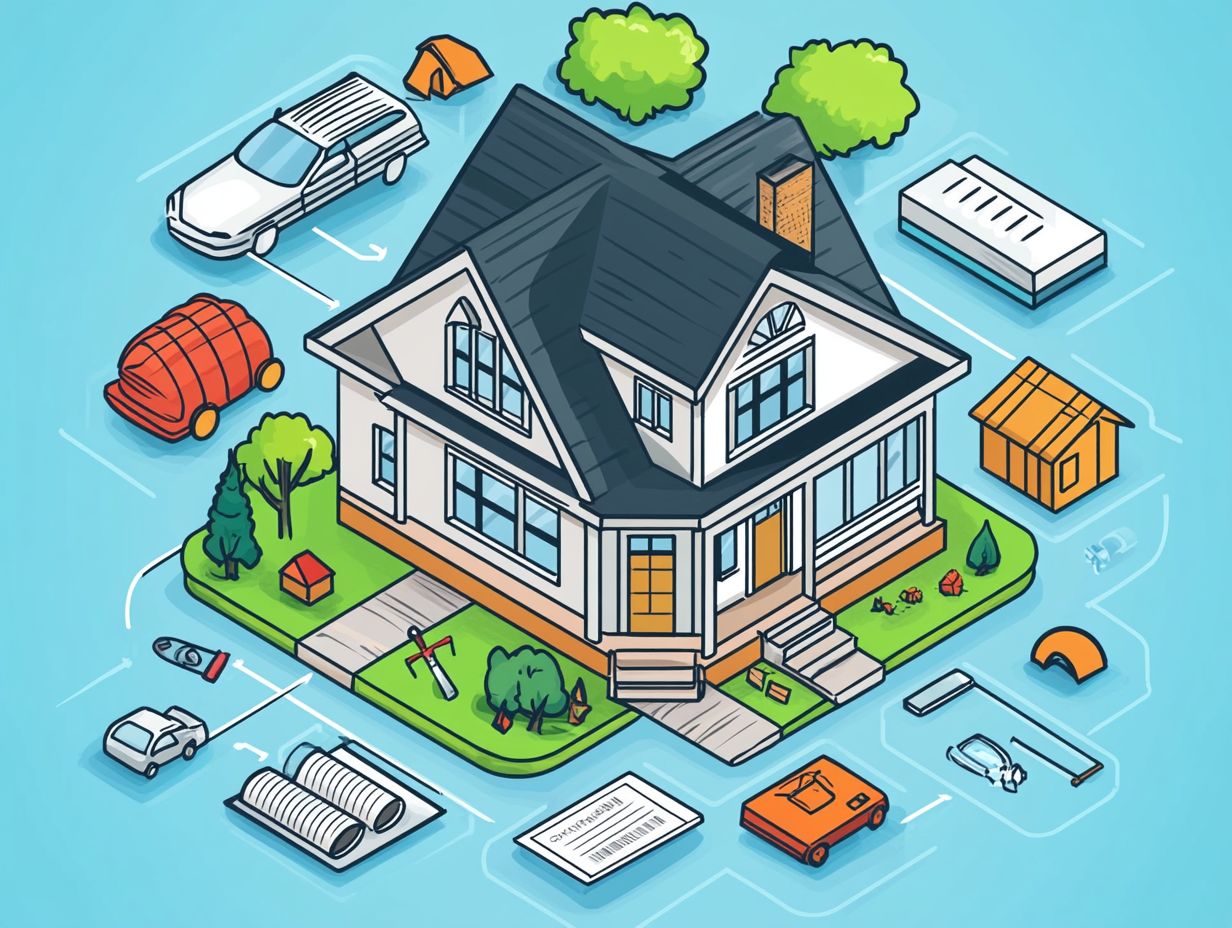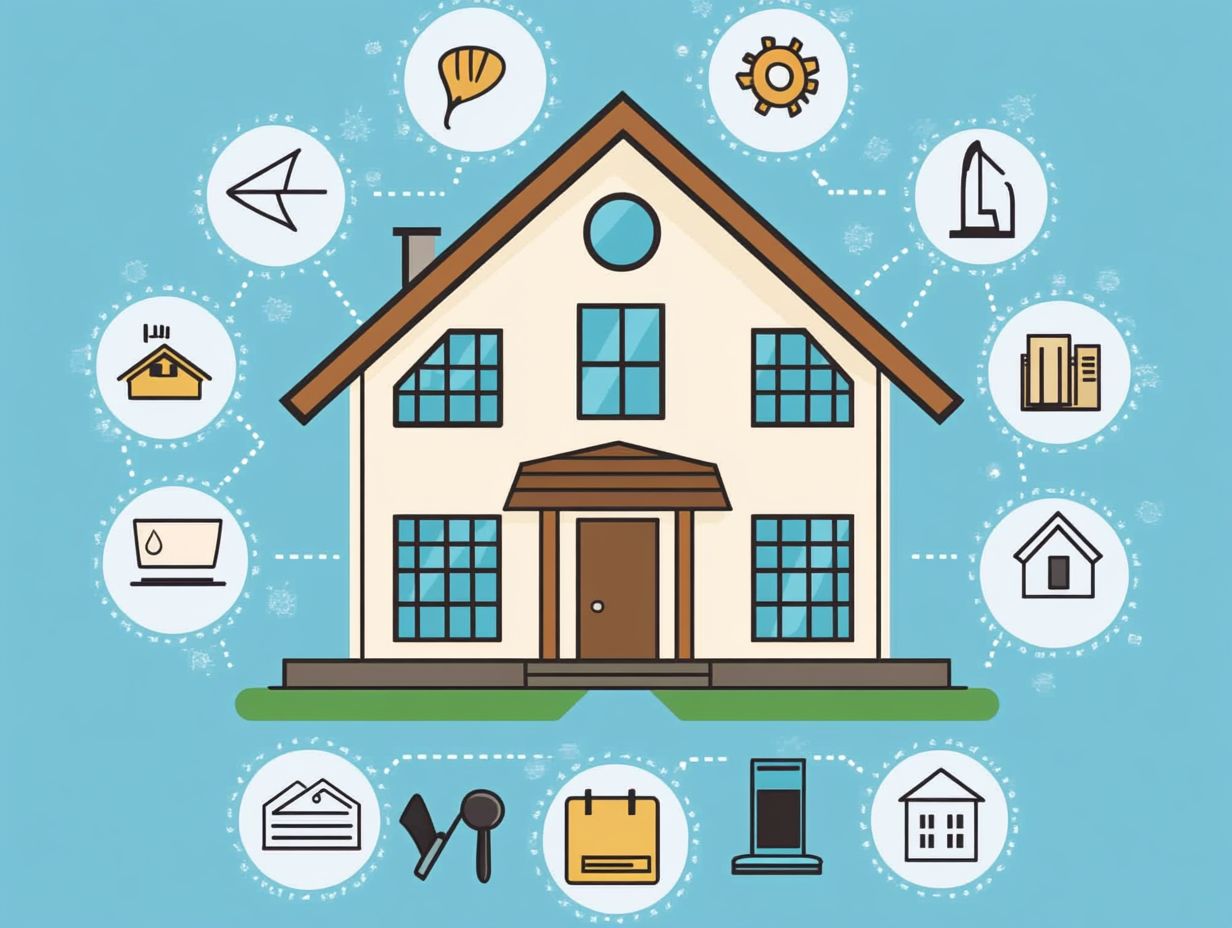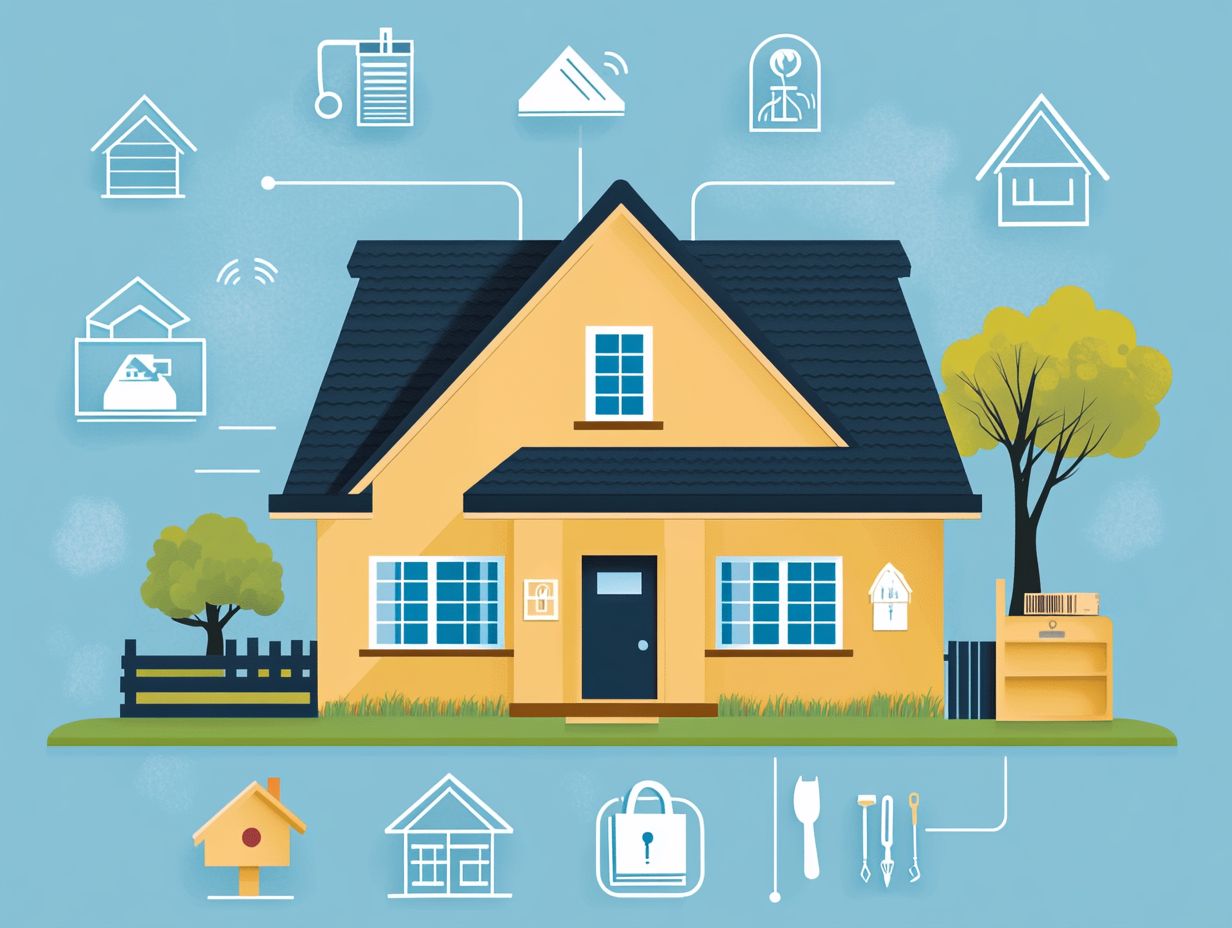What Are Common Home Insurance Exclusions?
Understanding home insurance can indeed be a challenge, particularly when it comes to exclusions those aspects that your policy simply won t cover.
This article aims to clarify what home insurance exclusions entail and spotlight some common types, such as natural disasters, acts of war, and intentional damage. It delves into how these exclusions affect your overall coverage and discusses strategies for addressing them, including additional coverage options and alternative policies.
By the time you finish reading, you ll be well-prepared to navigate your home insurance needs with confidence.
Contents
Key Takeaways:

Natural disasters, acts of war or terrorism, intentional damage, wear and tear, and specific personal property are common exclusions in home insurance policies. To better understand how these exclusions can affect coverage, homeowners can explore what are the most common home insurance claims that may result in limits and restrictions. Homeowners can address exclusions by considering additional coverage options or alternative insurance policies.
Understanding Home Insurance Exclusions
Understanding home insurance exclusions is crucial for homeowners like you who want comprehensive protection and wish to avoid unexpected financial burdens.
Homeowners insurance aims to shield your property from various risks; however, it frequently includes exclusions that may leave you vulnerable.
By grasping these exclusions, you can work with your insurance agent to identify potential gaps in your homeowners policy. This lets you customize your coverage to fit your specific needs!
What are Home Insurance Exclusions?
Home insurance exclusions refer to specific situations or types of damage that aren’t covered under your homeowners insurance policy.
These exclusions can have a substantial impact on your financial security. For example, standard policies typically don t cover damages caused by natural disasters like floods or earthquakes, leading to significant losses.
Without these coverages, you may find yourself fully responsible for repairs after such catastrophic events. Knowing these exclusions now can save you from costly surprises later!
Understanding these limitations is also crucial in preventing insurance fraud. When you know what isn t covered, it can deter deceptive claims and keep your insurance experience above board.
Types of Common Exclusions
Homeowners insurance policies often come with various common exclusions. Understanding what you should know about home insurance exclusions is key to securing the right coverage. These exclusions can include natural disasters such as floods and earthquakes, as well as other types of damage that might not be immediately obvious.
By being aware of these typical exclusions, you can make informed choices about your insurance options and consider supplemental policies to bolster your protection.
Natural Disasters
Natural disasters like floods and earthquakes are often glaring exclusions in homeowners insurance policies, leaving you exposed to potentially devastating financial losses.
This coverage gap arises from the astronomical costs associated with these catastrophic events, which is why insurance companies often offer them as separate policies. It’s crucial for you to understand that the risk of such disasters can vary dramatically depending on your region; for example, if you live in an area prone to seismic activity or heavy rainfall, you face distinct challenges.
By familiarizing yourself with the specific hazards in your locale, you can make well-informed decisions about securing additional coverage to safeguard your investment. This proactive stance not only enhances your financial security but also offers peace of mind as natural disasters become increasingly common.
Don’t hesitate to review your policy and reach out for advice on how to cover these risks effectively!
Acts of War or Terrorism

Many homeowners insurance policies explicitly exclude damages resulting from acts of war or terrorism, leaving you with significant gaps in coverage during catastrophic events.
Insurance providers avoid covering these events due to their unpredictable nature and potential for massive losses. This makes it financially burdensome for them to offer comprehensive protection.
If a devastating event like a nearby terrorist attack occurs, you could face substantial repair costs with no support from your standard insurance policy.
It’s wise to evaluate your current coverage. Consider specialized policies or endorsements that address these threats. A tailored insurance solution enhances your peace of mind and safeguards your financial security in these alarming scenarios.
Intentional Damage
Intentional damage is a critical exclusion that you, as a homeowner, need to keep on your radar. Typically, policies won t cover losses arising from your own deliberate actions.
This means if you vandalize your property or cause damage with the intent to defraud your insurance company, any claims related to that damage would likely be denied.
For example, if someone sets fire to their own home hoping to cash in on the insurance payout, they would face severe repercussions not just legally, but also within the confines of their policy.
The effects go deeper; honest mistakes or unforeseen accidents are one thing, but maintaining integrity throughout the claims process is essential. Insurance companies often carefully review claims for honesty, and fostering a transparent relationship can significantly impact how your claims are resolved.
Wear and Tear
Wear and tear is a common exclusion in homeowners insurance policies, meaning that routine maintenance issues typically fall outside of coverage.
This exclusion underscores the importance of grasping the implications of neglecting regular upkeep on your property. Over time, various components of your home like roofs, plumbing, and electrical systems naturally deteriorate.
If these concerns aren’t addressed proactively, they can snowball into significant issues leading to costly repairs. By engaging in periodic inspections, you can pinpoint potential trouble areas before they escalate.
Taking action now protects your home and keeps unexpected costs at bay. This proactive approach ensures you won t be blindsided by unexpected, uninsured damages.
Specific Personal Property
Homeowners insurance often comes with exclusions for certain personal property, particularly high-value items like jewelry, art, and collectibles. High-value items often have exclusions, exposing you to financial loss if those treasured possessions are damaged or stolen.
To address this gap, you might consider scheduling these high-value items on your policy. This typically requires a detailed description and appraisal of each item.
It’s crucial to understand that even with this additional coverage, there may still be limitations, such as caps on reimbursement amounts. Working with knowledgeable insurance agents can help ensure that your valuable possessions are adequately protected.
This gives you the peace of mind that your cherished items are safeguarded against unforeseen events.
How Exclusions Affect Coverage
Exclusions in homeowners insurance can greatly influence the overall coverage you receive, often resulting in limits and restrictions that may not be immediately apparent to you as a policyholder.
Limits and Restrictions

Understanding the limits and restrictions imposed by exclusions in homeowners insurance is essential for protecting your investment.
As a homeowner, it s crucial to be aware that certain common exclusions like water damage from flooding or specific natural disasters can significantly restrict the protection available to you during a claim.
For example, if you experience flooding in your basement and haven t purchased additional flood insurance, you could be looking at substantial out-of-pocket expenses.
Scenarios like this underscore the importance of carefully reviewing your policy’s language and conditions. By doing this, you can gain a clearer understanding of what is and isn t covered, empowering you to seek clarification from your insurance agent.
This proactive approach ensures you have the necessary coverage to effectively safeguard your home.
Ways to Address Exclusions
Addressing exclusions in homeowners insurance is crucial for securing comprehensive coverage.
Homeowners have several strategies at their disposal to navigate this complex landscape effectively.
Additional Coverage Options
Exploring additional coverage options can greatly enhance your homeowners insurance, particularly when it comes to addressing gaps related to flood and earthquake risks.
By considering these supplemental plans, you can ensure you have comprehensive protection tailored specifically to your circumstances.
If you live in an area prone to heavy rainfall or rising water levels, flood insurance becomes crucial.
Similarly, if you live in a seismically active area, earthquake coverage is essential.
Don’t overlook extra coverage for expensive items like jewelry, art, or electronics, as these often exceed standard policy limits.
It’s vital to carefully assess your unique needs and regional risks, as these factors significantly influence the appropriate coverage to secure your peace of mind.
Alternative Insurance Policies
For homeowners in search of more comprehensive protection, alternative insurance policies might offer greater coverage and fewer exclusions than traditional homeowners insurance.
These innovative options often feature specialized coverage tailored to address unique risks that standard policies may overlook.
By exploring these alternatives, you can find peace of mind knowing you re protected against specific challenges, such as natural disasters or home-sharing liabilities.
Work with experienced insurance professionals who can assess your specific situation and guide you toward tailored solutions that truly meet your needs.
This personalized approach not only enhances your coverage but also ensures you are well-informed about the best protections available.
Frequently Asked Questions
-
What Are Common Home Insurance Exclusions?
Common home insurance exclusions are specific types of damages or losses that are not covered by a standard home insurance policy. To better understand these, it’s important to know what home insurance exclusions are. These exclusions vary depending on the insurance provider and policy, but generally include certain natural disasters, intentional damage, and certain types of property.
-
Are Natural Disasters Covered by Home Insurance?
Floods, earthquakes, and hurricanes are typically excluded from standard home insurance policies. These events are considered high-risk and may require additional coverage or a separate insurance policy.
-
Does Home Insurance Cover Intentional Damage?
No, home insurance does not cover intentional damage caused by the policyholder or other individuals living in the home. This includes damage caused by vandalism, arson, or other malicious acts. Intentional damage is considered a criminal act and is not covered by insurance.
-
What Types of Property are Excluded from Home Insurance?
Certain types of property may be excluded from home insurance coverage, such as high-value items like jewelry, art, and collectibles. Other types of property that may be excluded include vehicles, business equipment, and pets. It’s important to review your policy to understand what is and isn’t covered.
Are Home-Based Businesses Covered by Home Insurance?
Most home insurance policies do not cover home-based businesses. If you run a business from home, you need separate business insurance to protect your assets and operations.
Can I Add Extra Coverage to My Home Insurance Policy?
You can add extra coverage to your home insurance through add-ons. These provide protection for specific items or events that your standard policy may not cover.
Discuss your coverage needs with your insurance provider to find the best options for you.







